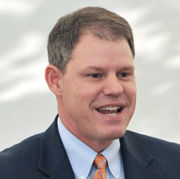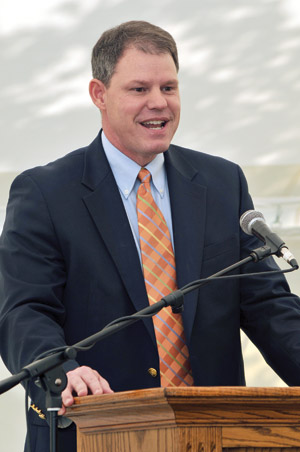The following is adapted from a speech given at the graduation ceremony for the Executive MBA Class of 2011.
My name is Alex Nicholson, and I’m 63 years old. A year and a half ago, I began a new job as a trading partner in a startup hedge fund. It’s the best job I’ve ever held—the best boss, the best environment and the most fun work. For the first time, I wake up early and can’t wait to go to work. I invest my own money in the fund, so I’m an owner as well as an employee. It’s also the most remunerative work I’ve ever done. I attribute my newfound success largely to the Vanderbilt Executive MBA program, but my path has been a circuitous one.

I was a late arrival to the business world. I was born and raised in Nashville and earned degrees in philosophy and law at Stanford. But after 20 years in California and unfulfilling stints in education research at Stanford and in corporate law in San Francisco, I returned to Nashville to reinvent myself. The family business, Nicholson’s Hi-Fi, which sold audio-video systems and had been successful since 1946, was encountering difficulties in 1987 and needed help. At age 38, I decided to join my father in the business.
Nicholson’s Hi-Fi grew and prospered in the 1990s, designing and installing home theaters, lighting control systems and home automation systems in Nashville’s finest residences. One day in 1998, after I had taken over the company from my father, it struck me that I didn’t know what the hell I was doing running a business with 25 employees and $3.5 million in annual sales. I had had no business education and only minimal on-the-job training. I was managing by the seat of my pants and unsure of every major decision.
I met with Tom Hambury, Owen’s Director of Executive Programs at the time, to ask whether I could benefit from the Executive MBA program. I expected him to say no, that the program was intended for rising midcareer employees at large corporations, who could use the degree to earn promotions and raises. Tom startled me when he responded, “The Vanderbilt Executive MBA is a lock-step, generalist program without specialization. Corporate employees, who are specialists, benefit greatly from the program. However, small-business owners, who have to be generalists, benefit most of all because they need every course in the curriculum.”
Tom was right. To run my business, I needed to learn accounting, human resources, strategy, economics, negotiation, finance, organizational behavior, operations, marketing, leadership, entrepreneurship, and statistics. And so, at age 50, the oldest in my class, I entered Owen in the fall of 1999. I looked forward to getting to know the beautiful Vanderbilt campus, but I ended up sitting in the same building, in the same classroom, in the same exact seat every class for two years. But I loved every part of the Executive MBA program—the professors, the classes, the reading, the students and the teamwork—everything that I had disliked about law school.
“After I had taken over the company from my father, it struck me that I didn’t know what the hell I was doing. I had had no business education and only minimal on-the-job training. I was managing by the seat of my pants and unsure of every major decision.”
—Alex Nicholson
Luke Froeb, the William C. Oehmig Associate Professor in Free Enterprise and Entrepreneurship, taught me where wealth comes from and convinced me to align my political interests with my economic interests. Ray Friedman, the Brownlee O. Currey Professor of Management and Associate Dean of Faculty and Research, taught me to negotiate from a broader perspective so that both sides could come out ahead. Germain Böer, Professor of Accounting and Director of the Owen Entrepreneurship Center, taught me how to start a new company, which made me glad my father had already done it, and I didn’t have to.
My favorite course at Owen, however, was the finance class taught by Bill Christie, the Frances Hampton Currey Professor of Finance and Professor of Law. Before Bill’s class, I didn’t even know what finance was. When I started to read the textbook over the semester break, I couldn’t put the book down. All of a sudden, the big picture of business made sense—companies, projects, debt and equity, dividends and buy-backs, the stock market. My favorite topic was options—puts and calls, profit and loss graphs, synthetic stock positions and real options.
But finance and options had little to do with Nicholson’s Hi-Fi. My purpose at Owen was to learn so that I could help my family business. I tried my best to share with my associates what I had learned. I found that task was much harder than anything I ever did at Vanderbilt. So I went back to the basics: I hired a coach to work on team building, which I considered the most fundamental lesson from Owen. We went on expensive overnight retreats, talked freely to each other and kept careful notes about our commitments to accountability.
None of it worked. I found out that the general manager disliked the salesmen because they could earn more than he could; the salesmen distrusted the technicians to install their systems correctly; and the technicians bullied each other and refused to follow directions from the general manager. Owen had elevated me to a higher plane of business consciousness, but I was unable to raise my company along with me.
After my graduation, the housing boom brought an onslaught of new competition in our industry—from the Internet, from big-box stores, and from local installers without the overhead expense of a retail store. Our revenue plateaued and by 2005 was starting to decline. The company that had supported our family so well for six decades now needed cash infusions from the family to cover its expenses. Soon I was $2 million in debt and unable to see a way out.
I finally realized that I had to let go of the idea of keeping the family business afloat. Remembering my interest in finance, I started taking classes in stock and options trading, which I enjoyed tremendously. In 2006 I sold our warehouse and started reducing my debt. In 2007 I sold the business operations to a Birmingham, Ala. audio-video company that wanted to open a Nashville branch. I made sure that all my employees had positions with the buyer and that all my customers’ jobs in progress were completed. Then I started trading options full-time for my own account. In late 2010 I sold my final parcel of real estate—the retail store, which had stood empty for four years—and paid off the remaining debt.
My solo options-trading career was successful, but my returns were inconsistent, and I felt unfulfilled. My wife, Laurie, encouraged me to find a real job—and get out of the house—while trading options on the side, so I went back to Owen to confer with Debbie Clapper, Associate Director of Executive and Alumni Career Services. She helped me redo my resume, which had been dormant for 25 years, and sent me job postings from Owen every day.
Then early last year, a friend of mine contacted me about a new fund she was starting. The best options trader I’ve ever known, she left the corporate world in 2007 to follow her passion: a charity she founded called Just Hope International, which provides infrastructure projects in the poorest parts of the world. While supporting herself and her charity by trading options, she started a closed hedge fund to allow her former business associates to invest with her.
When we met to discuss her new fund, she offered me the opportunity to invest. As I was about to ask if she needed another trader, she asked me first if I would be interested in working at the fund. Fortunately I had the requisite professional degree and a current resume. During the third interview, I knew she was going to make me an offer. Forgetting everything that Ray Friedman had taught me about negotiation, I jumped directly to my bottom line and said, “This is my ideal job. I know there is no money right now. I’ll work for free until the company can pay me.” She beamed with joy and said, “What a blessing you are to do this for us! But it may be a year or two before we’re profitable.”
Our company, Hope Investments LLC, based in Brentwood, Tenn., trades options and futures on the broad-based stock indices. We have been profitable since the first month and have now paid off our startup costs. A large share of our profit goes to support Just Hope International, the charity for which we are named. There are three partners, including myself, but no additional staff. My boss and other partner also serve as the president and executive director, respectively, of the charity. They are both now working to buy land in Sierra Leone, the poorest country in Africa, so that a self-supporting farm, orphanage, school, church and health clinic can be built there.
The opportunity at Hope Investments has enabled me not only to do well financially but to find a moral direction in my work. For that I have Vanderbilt to thank. Even though my original purpose in attending Owen was never realized, the Executive MBA program was the best educational experience I’ve ever had. Owen has given me the intellectual foundation to support a lifetime of continued learning in the business world. And when my perfect business opportunity came along, my education gave me the confidence to seize the moment—a moment that forever changed my life.

